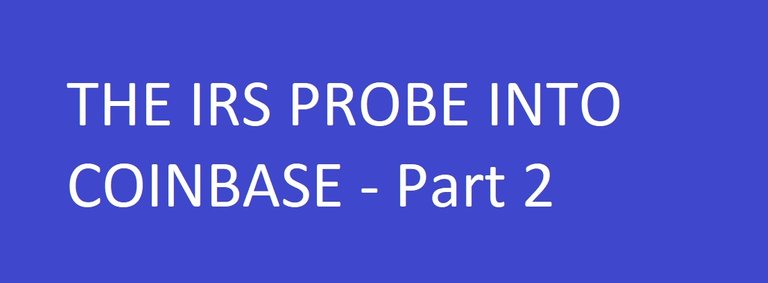
Be honest. When you heard the news that the IRS had asked Coinbase for the customer accounts for all U.S. citizens, did you say "Uh oh" and feel a shiver of fear?
Well, if you're an average investor at Coinbase, don't worry. The IRS blinked.
The IRS just told a federal court they only want information for accounts that had transactions worth $20,000 or more.
From the article:
An IRS spokesperson declined to comment on the investigation's new scope, which is limited—in the agency's words—to users with "at least the equivalent of $20,000 in any one transaction type (buy, sell, send, or receive) in any one year during the 2013-15 period."
If they mean $20,000 in a single transaction, we're in WHALE territory!
This naturally raises questions of privacy and anonymity. When you open an account at Coinbase, you have to provide personal information. If I remember correctly, I had to send a photo of my driver's license. And if you link to your bank account...well enough said. If you want anonymity, look elsewhere in my opinion.
What's scary is that in another Coinbase-related lawsuit, the IRS dropped their request for ** password and security settings** for the 500,000 accounts impacted by that action.
Read more here:
http://fortune.com/2017/07/10/bitcoin-irs-coinbase/
Image Credit
Seriously? Me, myself, and I. I like that particular shade of blue :)
Upvoted and followed.
Great information. One thing about the IRS, they have to justify their time. Hence, going after those who are moving around only small amounts of money, the tax implications on that is probably minimal.
That said, the point of the article holds. We are still in an era where cryptos have to be purchased on exchanges that are not decentralized. Until that happens, a company can always be forced/coerced into giving up the data. Coinbase prevailed for the most part...this time.
Absolutely true. Almost all exchanges require proof of identity. So if privacy or anonymity are your goals, your out of luck.
Perhaps we will see someone(s) put together decentralized exchanges where people can buy cryptocurrencies. If that happened, the government watchdogs would have a cow.
It would have to be an exchange that did no identity verification which would be unlikely. It looks like peer-to-peer is one option, but it's not at all perfect.
Agreed it would have to be some peer-to-peer network and would come with a host of challenges.
For now, so much for anonymity.